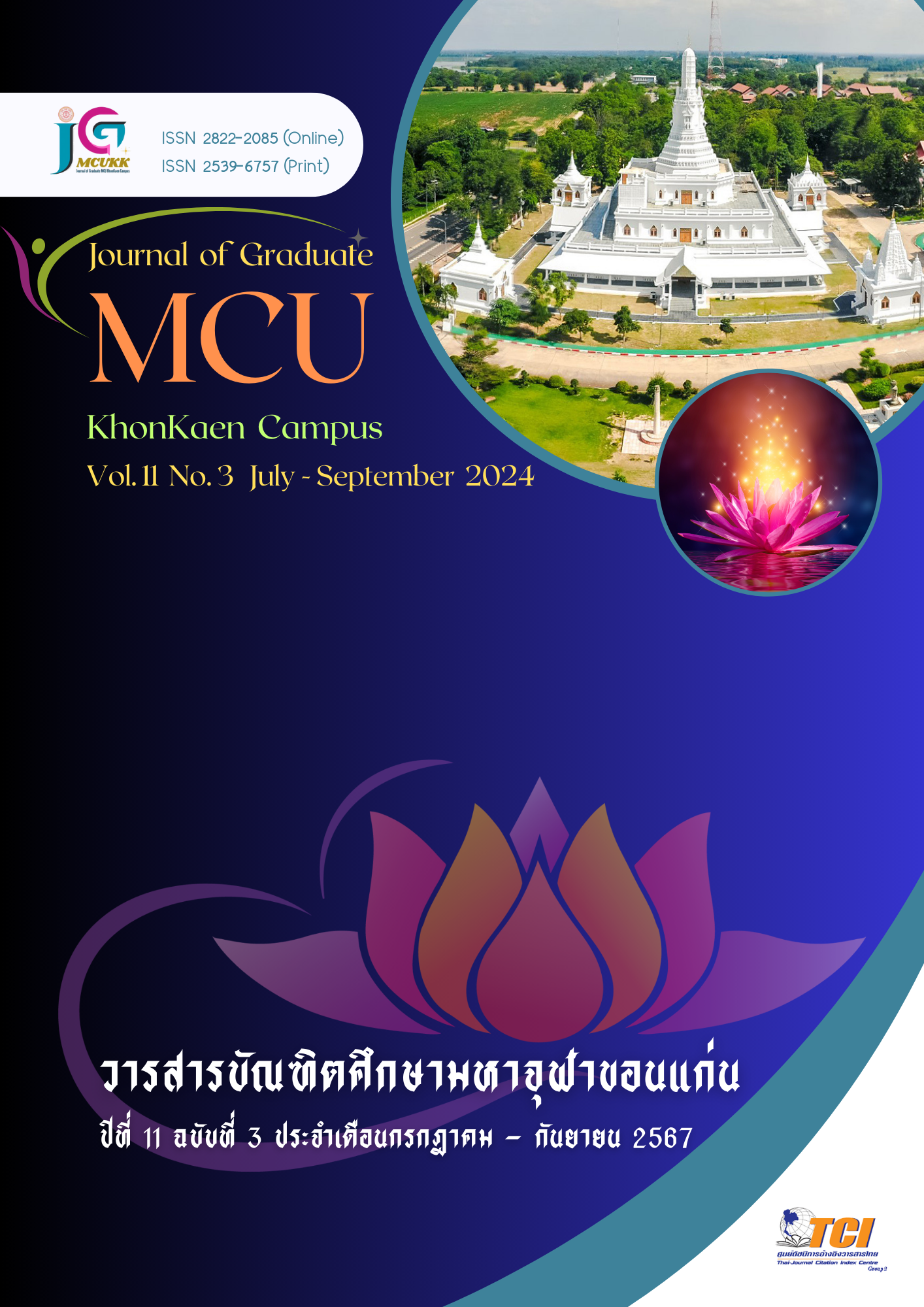The Management of Student Care Systems According to the Four Brahmavihra Principles in Schools Under the MahaSarakham Secondary Educational Service Area Office
Main Article Content
Abstract
This research aimed to: 1. study the state of managing student care systems according to the Four Brahmavihra Principles in schools under the Maha Sarakham Secondary Educational Service Area Office; 2. explore guidelines for managing student care systems according to the Four Brahmavihra Principles in schools under the same office. The study used a mixed-methods approach, combining qualitative and quantitative research. The research instruments included a questionnaire and an interview. The target group consisted of 327 school administrators and teachers, selected using the Taro Yamane formula with a 0.05 error margin. Data analysis for the quantitative aspect used descriptive statistics, including percentage, mean, and standard deviation, with the questionnaire having a reliability coefficient of 0.98.
The research results were as follows:
1. The state of managing student care systems according to the Four Brahmavihra Principles in schools under the Maha Sarakham Secondary Educational Service Area Office, was generally at a high level. The areas with the highest to lowest levels of practice were: Mett (Loving-Kindness), Upekkh (Equanimity), Mudit (Sympathetic Joy), and Karu (Compassion).
2. The guidelines for managing student care systems according to the Four Brahmavihra Principles in schools under the Maha Sarakham Secondary Educational Service Area Office, include Mett: screen and gather student information confidentially, showing close care and attention without neglecting problems that could affect society; Karu: organize parent-teacher meetings, build a parent network, and work together to provide student support, fostering a sense of security for parents; Mudit: recognize and commend students for good behavior and achievements, encouraging them to take pride in their talents and interests; Upekkh: record screening processes and student information, separate students with issues into groups for tailored support, and identify the root causes of problems to find appropriate solutions.
Article Details

This work is licensed under a Creative Commons Attribution-NonCommercial-NoDerivatives 4.0 International License.
References
กระทรวงศึกษาธิการ. (2562). พระราชบัญญัติการศึกษาแห่งชาติ พุทธศักราช 2562 (ฉบับที่ 4). กรุงเทพฯ: บริษัท สยาม สปอรต์ ซินดิเคท จำกัด.
กัณพัฒน์ แพงดาน. (2564). การบริหารงานกิจการนักเรียนตามหลักพรหมวิหาร 4 ของโรงเรียนขยายโอกาสสำนักงานเขตพื้นที่การศึกษาประถมศึกษาขอนแก่น เขต 4. (วิทยานิพนธ์มหาบัณฑิต). พระนครศรีอยุธยา: มหาวิทยาลัยมหาจุฬาลงกรณราชวิทยาลัย.
ชัยพล อนุสุวรรณ. (2564). แนวทางการดำเนินงานระบบดูแลช่วยเหลือนักเรียนตามหลักพรหมวิหาร 4 โรงเรียนขยายโอกาส สังกัดสำนักงานเขตพื้นที่การศึกษาประถมศึกษาอ่างทอง. (วิทยานิพนธ์มหาบัณฑิต). พระนครศรีอยุธยา: มหาวิทยาลัยมหาจุฬาลงกรณราชวิทยาลัย.
พระครูวินัยธรวรวุฒิ เตชธมฺโม (เฮียงเหี่ย) และคณะ. (2566). การวิจัยแบบผสมผสานวิธีทางหลักพรหมวิหารธรรม 4 สังกัดสำนักงานพระพุทธศาสนาแห่งชาติจังหวัดขอนแก่น. (วิทยานิพนธ์ครุศาสตรมหาบัณฑิต). พระนครศรีอยุธยา: มหาวิทยาลัยมหาจุฬาลงกรณราชวิทยาลัย.
พระครูอินทสารธรรม นรินฺโท (โคนพันธ์). (2562). การบริหารตามหลักพรหมวิหาร 4 ของผู้บริหารโรงเรียนในสังกัดสำนักงานเขตพื้นที่การศึกษาจังหวัดอำนาจเจริญ. (วิทยานิพนธ์มหาบัณฑิต). พระนครศรีอยุธยา: มหาวิทยาลัยมหาจุฬาลงกรณราชวิทยาลัย.
พระนิรันดร์ จรณธมฺโม. (2561). การบริหารโรงเรียนพระปริยัติธรรม แผนกสามัญศึกษาตามพุทธบริหารการศึกษา. วารสารครุศาสตร์ปัญญา, 2(2), 66-82.
ภัทรานิษฐ์ เหมาะทอง และคณะ. (2560). การกำหนดตัวอย่างโดยใช้สูตร Yamane. สืบค้นเมื่อ 10 มีนาคม 2567, จาก https://sc2.kku.ac.th/stat/statweb/images/Eventpic/60/Seminar/01_9_Yamane.pdf
โรงเรียนบรบือวิทยาคาร. (2563) คู่มือนักเรียน ผู้ปกครอง. มหาสารคาม: สารคามการพิมพ์.
สำนักงานคณะกรรมการการศึกษาขั้นพื้นฐาน. (2565). คู่มือการคัดเลือกสำนักงานเขตพื้นที่การศึกษาและสถานศึกษา เพื่อรับรางวัลระบบการดูแลช่วยเหลือนักเรียน. กรุงเทพฯ: ศูนย์เฉพาะกิจคุ้มครองและช่วยเหลือเด็กนักเรียน.
สำนักงานรับรองมาตรฐานและประเมินคุณภาพการศึกษา. (2547). พระราชบัญญัติการศึกษาแห่งชาติ พ.ศ. 2542 แก้ไขเพิ่มเติม (ฉบับที่ 2) พ.ศ. 2545. กรุงเทพฯ: บริษัท พริกหวานกราฟฟิค จำกัด.
สุภางค์ จันทวานิช. (2540). วิธีวิจัยเชิงคุณภาพ. กรุงเทพฯ: จุฬาลงกรณ์ราชวิทยาลัย.

